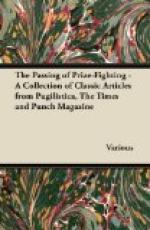The Puddlesby Psychical Society believes in the Transmigration of Souls. As I am not a member myself I’m afraid that that is all I can tell you about it. It is a little difficult at first sight, perhaps, to see the connection between Transmigration and rubber tyres, but if you will have patience I think I can promise to show you that at least.
One night our Mr. Bowles came home late from a meeting of the P.P.S., fell asleep at once and had what he regarded as a “transmigratory experience in a retrogressive sense.” The world was not the world he knew. He perceived that it was sundown on the 8th of August, 1215, that he was no longer plain Bowles, but rather Sir Bors the Bowless, Knight of the Artful Arm, and known to his intimates as “The Fire-eater”; that he had just been challenged to fight his seven hundred and forty-seventh fight, and (for the seven hundred and forty-seventh time) he had accepted. He soon added to the stock of his information the fact that, as the challenged party, he had the choice of time, place and weapons.
He was naturally a little perturbed at first, for the most formidable warrior that he ever remembered fighting was his little sister, whose hair he had pulled when they were children, and the biggest thing he had ever killed was undoubtedly the hen that he had run over on the Boodle Road. He felt inclined, therefore, in the first flush of terror, to propose as the time 1925, as the place Puddlesby Football Field, and as the weapon, motor-tyre valve pins, at two hundred yards. He even got as far as mentioning these conditions to his friend Sir Hugh the Hairy, who, however, did not seem particularly struck with the suggestion, but made a counter-proposal of maces on horseback at the neighbouring lists in three days’ time.
Before our hero knew what he was about he found that he had agreed. He got through a deal of heavy thinking on his way home to his castle, but had fortunately completed his plan of campaign before he arrived, for the esquire of his enemy was awaiting him there, demanding to know the details of the coming contest. He made the conditions suggested by Sir Hugh, merely adding that the maces must be smooth and not knobbed, as was customary in the better-class combats of that day.
He then began to make his preparations. At first he was considerably depressed by the entire absence of all rubber, until dire necessity compelled him to find a serviceable substitute in the shape of untanned ox-skins. These he carefully sewed together with his own knightly hands, coating the stitches over with pitch and resin. He was a good workman and did not fail to be ready in time.
When the hour of combat arrived he vanished into the painted pavilion reserved for him at one end of the lists, accompanied only by his faithful esquire. Hastily he donned his suiting of reinforced ox-hide, which covered the whole of his person from head to foot, and hung stiffly in folds all round him. Then, holding out a metal tube which was attached to the front of the costume, he presented it to his esquire, saying in the vernacular of those stout times—




